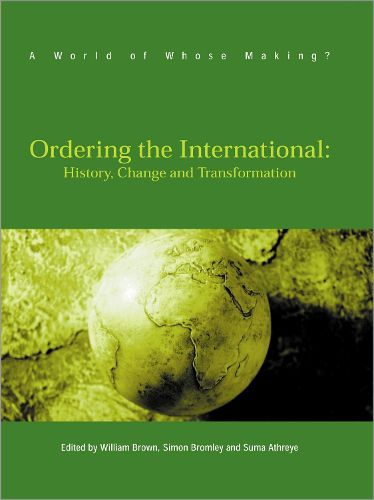Readings Newsletter
Become a Readings Member to make your shopping experience even easier.
Sign in or sign up for free!
You’re not far away from qualifying for FREE standard shipping within Australia
You’ve qualified for FREE standard shipping within Australia
The cart is loading…






Ordering the International is a new and exciting textbook which teaches the core themes of International Studies in an innovative way. It asks: Can we analyse international order as a whole, and if so, how? How can we best characterise, understand and explain the processes of international interaction and the kinds of order and disorder with which they are associated? Is the contemporary international system changing and, if so, by whose agency? The book undertakes this task through an analysis of the historical origins, evolution and transformation of three sectors of the modern international system: the political, the socio-cultural, and the economic-technological. It draws on a combination of approaches and debates in International Studies and concludes by discussing theories of international order and contending claims about its transformation. Specifically, Ordering the International is divided into four parts: States and the state system teaches the origins and spread of the state system, the contested universality of its governing principles and the debates around the rise of a liberal international order and the power of the United States. Culture, rights and justice analyses the tensions and interconnections between cultural values, claims of universal rights and attempts to fashion justice at the international level. Technology, inequality and the network society looks at the historical shaping of patterns of international economic inequality, the role of technological change in this and the elaims that new, network forms of order are reshaping the international. Theories of international order concludes the book by drawing out the major theories of international order, and the debates about a transformation in the nature of international order, from the substantive debates discussed in the previous parts. Ordering the International will provide you with the knowledge and skills to understand, and participate in, the key debates about the world in which we live.
$9.00 standard shipping within Australia
FREE standard shipping within Australia for orders over $100.00
Express & International shipping calculated at checkout
Ordering the International is a new and exciting textbook which teaches the core themes of International Studies in an innovative way. It asks: Can we analyse international order as a whole, and if so, how? How can we best characterise, understand and explain the processes of international interaction and the kinds of order and disorder with which they are associated? Is the contemporary international system changing and, if so, by whose agency? The book undertakes this task through an analysis of the historical origins, evolution and transformation of three sectors of the modern international system: the political, the socio-cultural, and the economic-technological. It draws on a combination of approaches and debates in International Studies and concludes by discussing theories of international order and contending claims about its transformation. Specifically, Ordering the International is divided into four parts: States and the state system teaches the origins and spread of the state system, the contested universality of its governing principles and the debates around the rise of a liberal international order and the power of the United States. Culture, rights and justice analyses the tensions and interconnections between cultural values, claims of universal rights and attempts to fashion justice at the international level. Technology, inequality and the network society looks at the historical shaping of patterns of international economic inequality, the role of technological change in this and the elaims that new, network forms of order are reshaping the international. Theories of international order concludes the book by drawing out the major theories of international order, and the debates about a transformation in the nature of international order, from the substantive debates discussed in the previous parts. Ordering the International will provide you with the knowledge and skills to understand, and participate in, the key debates about the world in which we live.